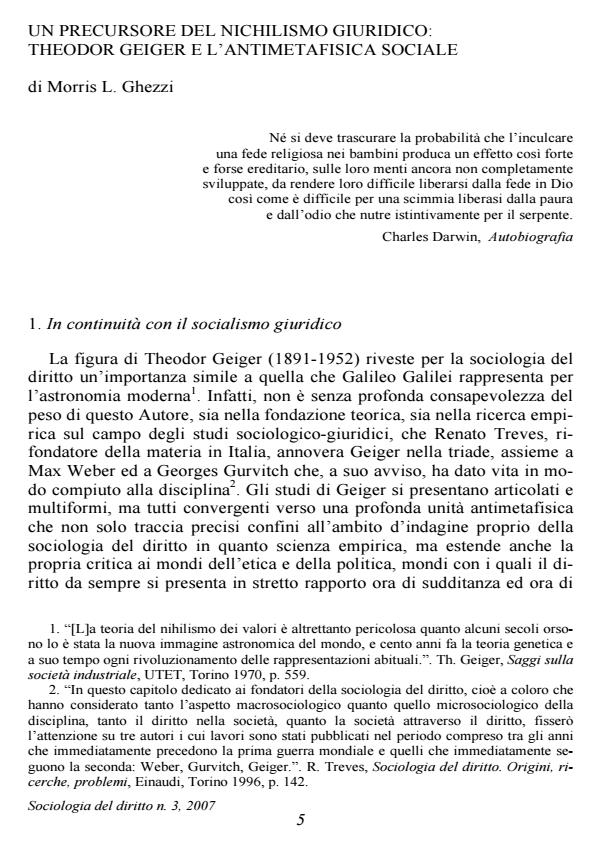Un precursore del nichilismo giuridico. Theodor Geiger e l'antimetafisica sociale
Titolo Rivista SOCIOLOGIA DEL DIRITTO
Autori/Curatori Morris L. Ghezzi
Anno di pubblicazione 2008 Fascicolo 2007/3
Lingua Italiano Numero pagine 41 P. 5-45 Dimensione file 245 KB
DOI
Il DOI è il codice a barre della proprietà intellettuale: per saperne di più
clicca qui
Qui sotto puoi vedere in anteprima la prima pagina di questo articolo.
Se questo articolo ti interessa, lo puoi acquistare (e scaricare in formato pdf) seguendo le facili indicazioni per acquistare il download credit. Acquista Download Credits per scaricare questo Articolo in formato PDF

FrancoAngeli è membro della Publishers International Linking Association, Inc (PILA), associazione indipendente e non profit per facilitare (attraverso i servizi tecnologici implementati da CrossRef.org) l’accesso degli studiosi ai contenuti digitali nelle pubblicazioni professionali e scientifiche.
Theodor Geiger’s socio-legal thinking constitutes a critical continuum with that of late nineteenth century legal socialism. In particular, Geiger, whom Renato Treves numbered among the founders of modern sociology of law, developed a close-knit analysis of the Marxist theory of law, highlighting how law becomes a focal factor in social transformation in democratic societies of the kind that are governed by the consent expressed by universal suffrage of the population practised at regular intervals. Revolutionary socialism could and had to give way to reform socialism, he argued, on the road to the libertarian and egalitarian emancipation of weaker social groups. Geiger was educated in Germany at an exceptionally dramatic time in history, as the Weimar Republic stumbled to an end and the era of National Socialism dawned. That development forced him to go into exile, first in Denmark and later in Sweden, where he came into direct contact with the Uppsala school, in particular with Axel Hägerström: it was in this context that he developed the salient characteristics of his antimetaphysical thinking. He was then to develop this school’s theoretical nihilist thinking until he exceeded it with practical nihilism, which did not stop at just denouncing the falseness of all values, but went further to discourage their use, because of the irrational emotivity they may trigger. Geiger’s nihilism of values therefore paved the way for a precise form of legal nihilism, which encourages the construction of a sober democracy, i.e. one that is capable of raising conflict to the intellectual level and of anaesthetising feelings, as it is aware of its own inability to make any proclamation of value, ethics or policy about the nature of truth.
Morris L. Ghezzi, Un precursore del nichilismo giuridico. Theodor Geiger e l'antimetafisica sociale in "SOCIOLOGIA DEL DIRITTO " 3/2007, pp 5-45, DOI: